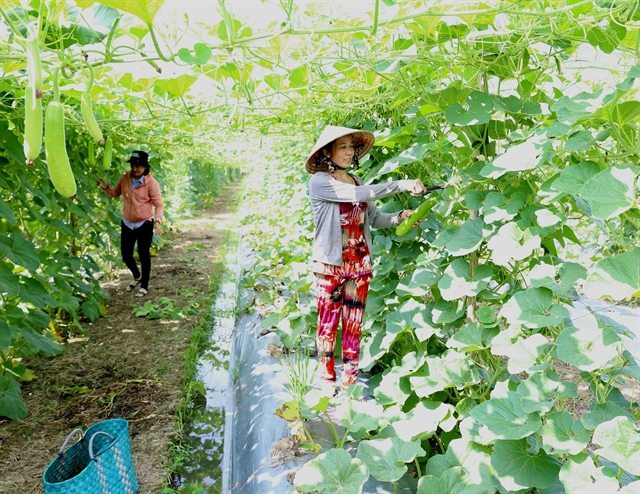 Society
Society


|
| Cần Thơ City is increasingly using advanced farming techniques to increase agricultural productivity. – VNA/VNS Photo Vũ Sinh |
CẦN THƠ – The Cửu Long (Mekong) Delta city of Cần Thơ has developed 183 advanced farming models and six concentrated farming areas, according to its Department of Agriculture and Rural Development.
It has also developed 41 safe food supply chains and origin traceability stamps for 292 agriculture, forestry and fisheries items.
It has spent more than VNĐ231.6 billion (US$10 million) since 2017 to develop advanced farming models that meet the standards set by the Ministry of Agriculture and Rural Development, embrace mechanisation and use advanced techniques like net houses and automatic efficient irrigation.
The use of automatic efficient irrigation has helped reduce costs and increase yields by 20 – 25 per cent.
The city has mechanised all stages of rice farming, from land preparation and sowing to harvest and post-harvest handling.
The concentrated farming areas grow key crops like rice, vegetables, short-term commercial crops and speciality fruits, and have contracts with agribusinesses to ensure farmers have outlets and get consistent prices.
The city has 214,000ha of land under rice this year, with high-quality varieties grown on 80 per cent of the area.
The city’s agriculture, forestry and fisheries output this year is expected to top VNĐ5.6 trillion ($241 million), up 6.6 times from 2016, according to the department.
Aquaculture
The city has 9,000ha of aquaculture farms and will have an estimated output of 224,000 tonnes this year, up 10 per cent from 2016, according to its Fisheries Sub-department.
Tra fish accounts for about 80 per cent of the total output, and its exports are worth US$500 million a year, or a third of the city’s total exports.
Speaking at a seminar on Tuesday (November 3), Trần Thanh Hải, head of the sub-department, said a breakthrough in tra farming began 20 years ago when Cần Thơ City University in co-operation with research units successfully produced tra fish fry artificially for breeding.
The city has 45 tra processing companies which produce various products for exporting to more than 100 countries and territories, according to Hải.
But farms still rely mostly on manual labour for certain things like feeding and harvesting and could be mechanised to increase productivity.
The city has two co-operatives and 35 households linked with tra fish processors, and nine companies that breed the fish on a total area of 251ha.
The city has certified and granted codes for 301 tra farms with a total area of 580ha that meet quality requirements in terms of breeding, feeding and use of medicines and chemicals.
Under a plan to adopt advanced aquaculture techniques, the city will develop a concentrated farming area for producing tra fish fry in Cờ Đỏ District and a concentrated farming area in Thốt Nốt District, each 100ha in size.
It will use modern facilities and advanced farming techniques like recirculating aquaculture systems, aquaponics and biofloc technology to increase yields, prevent diseases and protect the environment.
Nguyễn Thanh Dũng, deputy chairman of the city People’s Committee, said to improve the programmes for adopting advanced techniques in agriculture, more attention should be paid to developing electronic origin traceability for each product and to the quality of animal and aquatic strains and the use of feed.
“These things will help improve the competitiveness and productivity of agricultural products, reduce costs and meet the requirements of fastidious export markets.” – VNS




